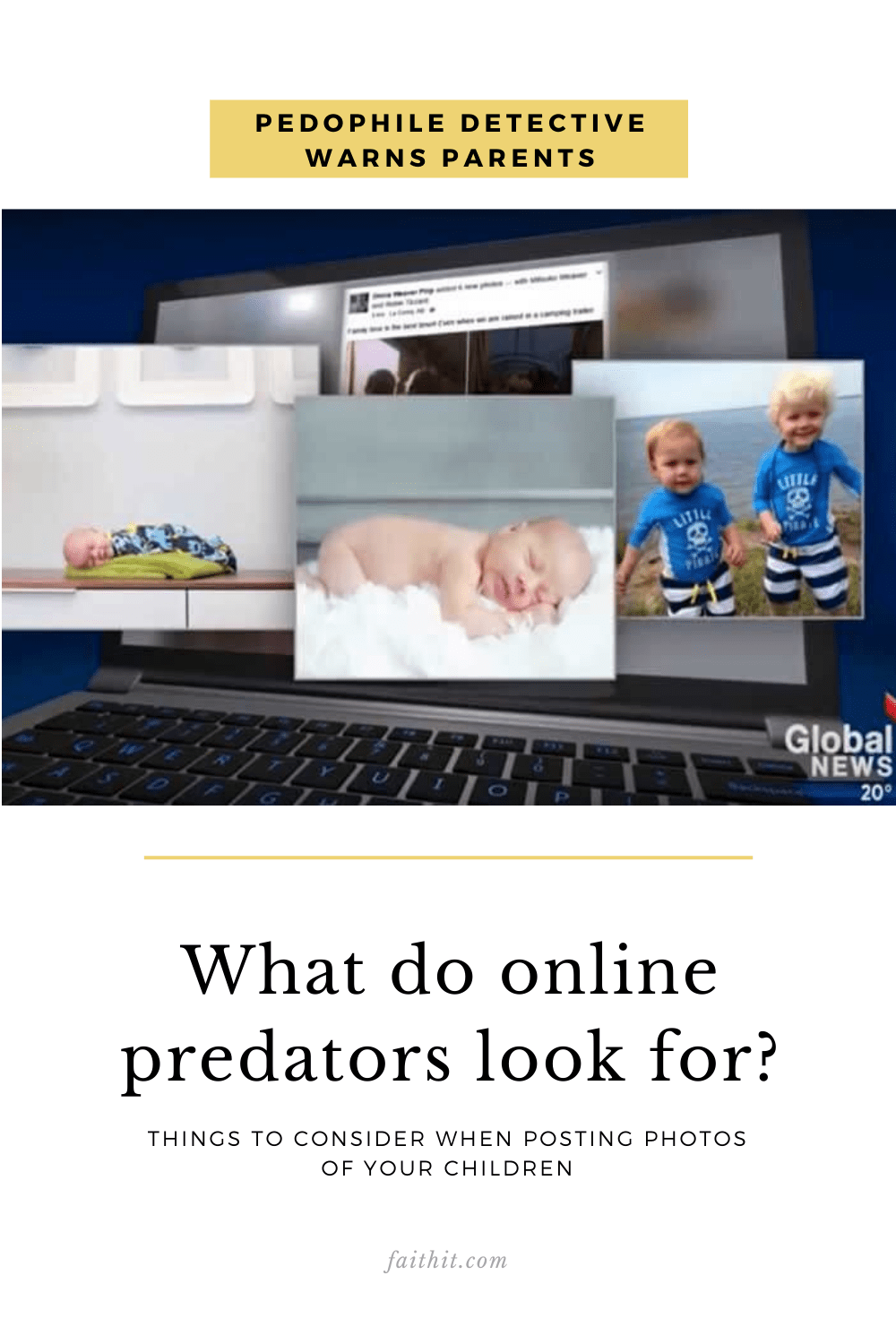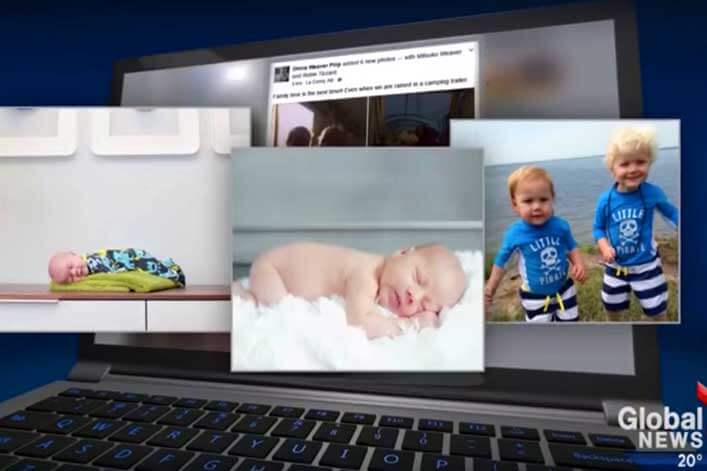If you’re anywhere on social media, you’re probably no stranger to the daily kiddie pics of everyone’s children.
Trust me, I’m right there with you. I currently have SEVENTEEN (not exaggerating) friends who are pregnant with babies and giving birth sometime in the next 90 days. My feeds are full of kids, and while I love seeing each of these babes grow up and learn new things, I often wonder about their safety—not because my friends are bad parents, but simply because these children’s lives are being freely showcased on social media.
Hashtags have been around for a while, but something I’ve seen as more and more of my friends continues to have kids are hashtags of their children’s names. I’m not talking, #Sarah. No, I’m talking FULL names: #JonahAndrewSmith.
The Internet is a scary place, and for years we’ve been told to protect our teenagers and monitor our kids’ Internet usage. But what about protecting those who don’t yet use the Internet? Online predators aren’t limited to targeting a select group of society like middle school girls. No, they prey on parents, and even the most innocent photos of your kids could be the fuel these sickos are looking for. What do online predators look for?
In 2016, an Australian website made world news when explicit photos of local schoolgirls were being traded amongst users. Other sources and fan pages even started offering money to users who could find more photos of their “favorites.” Unbelievably, the worst part isn’t even the fact that these girls are now being targeted, and their photos are being sold and traded by perverts, but rather that their images have been used without consent, and it’s very well possible that these girls are completely oblivious.
I mean, why wouldn’t they be? You don’t know when someone uses one of your photos on social media, hence the entire premise around MTV’s “Catfish.”
In cases like this where photos of minors are being sold and traded through pedophile rings, it’s oftentimes impossible for police to locate you if photos of your child are being used. Technological advances are like a double-edged sword. Predators have the ability to mask their IP addresses, use servers overseas, and completely hide their identity. There are even websites that teach online predators how to cover their tracks.
So what does this mean for us as parents? Don’t ever post a photo of your child again?
Well, no. We all know the risks of social media, so start by increasing your privacy settings.
If we’re being honest, there’s no reason for someone who doesn’t know you in real life to need to know what your family looks like. Your friends get your updates while keeping those who you’ve not accepted—out.
Beyond that, there are some things you should know about the types of photos you post of your children.
Erin Cash is a woman with 12 years of experience in the Queensland Police force. She’s worked as both a detective in pedophile and child abuse task forces.
In a powerful blog post that’s taken her more than 10 years to write, Erin shares some powerful advice on what parents need to know.
“It has taken over a decade for me to write this post because I know that I will have re-visited images and situations from my career that haunt me,” wrote Erin.
But she believes NOW is the time to educate parents on this pressing matter.
Generally speaking, when you take a picture of your kids, it never crosses your mind what you might photoshop in or out of that photo. Obviously your child is perfect, the photo is sweet, so there’s no need to change a thing.
While that may be the case for parents, Erin explains that online predators see things much differently. A picture of your 7-year-old in her modest, one-piece (KIDS) bathing suit at the beach can quickly become a naked photo of your daughter with a couple of snips and pastes in photoshop. It may not be “her body,” but her face is now being passed around in circles of nasty people.
It may seem sweet to post photos of your kids bathing, or running around half-dressed—especially if there’s a good story to go along with it—but generally speaking, you wouldn’t post photos like that of yourself, so protect your kids by doing the same.
Beyond the obvious—pedophiles DO look for photos that are not just exposed body parts. This is where things get a little scary because it’s one thing to never think about photoshopping your kid in a picture, but what about photoshopping the things around them? Online predators are notorious for using what most of us would consider a “normal” or “sweet” photo, and turning it into something nasty. They often look for photos that can be altered to make your child or teen look like they are part of a sexual act.
Though sometimes, Erin admits altered images aren’t always the case, even when she prays they are. She recalled one particularly vivid and scarring photo that has never left her mind:
“I used to pray that when I saw a photo of a baby in a nappy and a sexually aroused man in the image that the image was ‘superimposed.’ I didn’t always receive this comfort from the government classifier or the photographic specialists. This is is the horrific reality of child sex crimes and trafficking in the 21st century. There is one photo in particular that I remember which causes me pain daily—a 6-month-old in just a nappy with the most beautiful angelic smile laying on a bed—and a naked man entering the baby’s bedroom. This child looked like my babies—your babies. And the horror that I could not reach through that screen and save that child scratches at my brain.”
So now that all of our stomachs are turning, and half of us have already deleted 70 percent of our Facebook/Instagram photos, let’s talk about some ways that we can be proactive about protecting our children from becoming oblivious victims of pedophile rings.
As I said before, make adjustments to who is able to see your posts and who isn’t. People who don’t know you or your children have no reason to know what they look like.
It also helps to be mindful. Our children are adorable, especially when they’re only in a diaper and somehow covered in spaghetti sauce. But, you would never post a photo of yourself wearing nothing but a diaper. It seems so innocent, but the consequences of what we think are cute can turn creepy REAL fast.
Erin offers these key bullet points to consider before posting pictures of your kids:
What do online predators look for?
Things to consider when posting photos of your children:
- Is there enough room to ‘superimpose’ another figure into the image?*
- Are they in a state of undress (even with emoticons placed modestly—these can be removed and body parts can be photoshopped in)?
- Do you have a public social media page? Pedophiles can develop ‘child crushes’ and the child does not have to be posed or in a state of undress for the photo to become a commodity.”
Before sharing any photos of your kids, it’s important to look and determine if there is enough room to add figures or objects into the photo. I know this sounds crazy because if you’re at Disneyland, the picture of your child is most likely going to be this tiny little human with a massive castle behind them. But for the sake of safety, it’s important to at least consider before posting.
It’s no secret that teenagers are a hot commodity among online predators and pedophile rings. Being mindful of what and how you post on social media is important at any age. According to Erin, there are also a few key things to look out for in your teens’ social media pics:
Things to be considered with your teen’s social media images:
- Duck faces and posed photos are used as baseline trading images on predator sites.
- Swimwear and underwear shots become more valuable.
- If their account is public then the predator ‘ring’ can approach friends (or enemies) of the teen and pay money for more explicit photos.”
We live in an age where the world is completely connected. There are more people on Facebook today than there were on the entire earth 200 years ago. It’s a privilege to be able to stay close with people—friends and family who aren’t geologically close to us. But knowing the associated risks of using social media to broadcast our lives means that we are aware of the dirty stuff that we try not to think about when showcasing the memories that we have the ability to capture.
Protect yourself, protect your kids, SHARE this valuable information with fellow parents, and know what do online predators look for.


